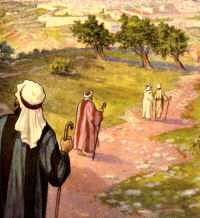» Enjoy our Liturgical Seasons series of e-books!
When Jesus went into the region of Caesarea Philippi he asked his disciples, "Who do people say that the Son of Man is?" They replied, "Some say John the Baptist, others Elijah, still others Jeremiah or one of the prophets." He said to them, "But who do you say that I am?" Simon Peter said in reply, "You are the Messiah, the Son of the living God." Jesus said to him in reply, "Blessed are you, Simon son of Jonah. For flesh and blood has not revealed this to you, but my heavenly Father. And so I say to you, you are Peter, and upon this rock I will build my church, and the gates of the netherworld shall not prevail against it. I will give you the keys to the kingdom of heaven. Whatever you bind on earth shall be bound in heaven; and whatever you loose on earth shall be loosed in heaven" (Matt. 16:13-20).
The Memorial of St. Monica, which is ordinarily celebrated today, is superseded by the Sunday liturgy.
Commentary on the Sunday Mass Readings for the Twenty-First Sunday in Ordinary Time, Year A:
The First Reading is taken from the Book of the Prophet Isaiah 22:19-23. Because of the reference to the "key of the house of David" in this text, some Fathers saw in it a messianic prophecy, foretelling the removal from power of the leaders of the Chosen People of the Old Testament, and the transfer of that power to Christ, who in turn handed it to Peter as head of the Church, the new Chosen People.
The Second Reading is from the Letter of St. Paul to the Romans 11:33-36 in which he offers praise and thanks to God for including everyone in the salvation He offered, first to the Jews, then to the Gentiles.
The Gospel is from St. Matthew 16:13-20. Jesus, the true Son of God, became man in order to make all men His brothers and co-heirs with Him, to the divine, eternal kingdom. To carry on His divine mission on earth (after He had ascended into heaven), He founded the Church on the twelve Apostles. This Church was to be God's new Chosen People (hence perhaps the twelve Apostles take the place of the heads of the twelve tribes of the Chosen People of old). It was to be made up of all races from all parts of the world. As its mission was to bring the message of salvation to all men, it was to go on until the end of time. For this Church, this divinely instituted society of human beings, to carry out its mission of helping all men to reach their eternal kingdom, it was necessary to be sure of the road and the aids offered to its members. In other words, the Church should be certain that what it told men to believe and to practice was what God wanted them to believe and to practice. Today's reading from St. Matthew tells us how Christ provided for this necessity. In making Peter the head of the Apostolic College, the foundation-stone of his Church, the guarantor of its stability in the symbol of the keys and the promise that all his decisions would be ratified in heaven, Christ gave him the power of freedom from error when officially teaching the universal Church.
In other words, Peter received the primacy in the Church and the gift of infallibility in his official teaching on matters of faith and morals. As the Church was to continue long after Peter had died, it was rightly understood from the beginning that the privileges given to him and which were necessary for the successful mission of the Church, were given to his lawful successors-the Popes.
This has been the constant belief in the Church from its very beginning. The first Vatican Council solemnly defined this dogma and it was reconfirmed recently in the second Vatican Council. In giving these powers to Peter and to his lawful successors Christ was planning for our needs. In order to preserve and safeguard the right conduct of all its members He provided a central seat of authoritative power in His Church. Through the gift of infallibility He assured us that whatever we were commanded to believe (faith) or to do (morals) would always be what He and his heavenly Father wanted us to believe and to do.
How can we ever thank Christ for these marvelous gifts to his Church, that is, to us? Let us say a fervent: "thank you, Lord; You have foreseen all our needs and provided for them, grant us the grace to do the little part you ask of us in order to continue our progress on the one direct road to heaven."
—Excerpted from The Sunday Readings by Fr. Kevin O'Sullivan, O.F.M.






